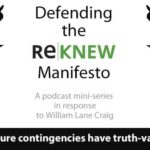We run our website the way we wished the whole internet worked: we provide high quality original content with no ads. We are funded solely by your direct support. Please consider supporting this project.
How do I avoid feeling like God is absent?
Question: I used to see God involved in everything and used to believe every event expressed God’s will. After my wife and I lost our child in a tragic accident, and as a result of reading your books (especially Is God to Blame?), I came to embrace the warfare worldview and the open view of the future. This helped my wife and I deal with our tragedy, but over the last few years I’ve noticed a negative consequence. Because all free agents have “say so” and because of the innumerable complexity of variables that affect all that comes to pass, I’m beginning to see the world as completely random! I have trouble seeing God involved in my life and in world history at all. Because of all the variables that affect what comes to pass, I have no assurance that my prayer will be answered and no assurance that any event in my life has a divine purpose. I also find myself worrying that I will die a random, meaningless death. How do I avoid feeling like God is absent?
Response: I’m so sorry for the loss of your child, and I totally understand your sentiments. When a person has grown accustomed to seeing everything as reflecting God’s will, embracing the notion that agents have genuine “say so” and embracing the complexity of the world can push them to an imbalanced opposite extreme where they begin to see everything as completely random. See if this reframe helps.
You can and should continue to see God involved in every thing at every moment. Nothing happens that he is not on some level involved in – nothing. In fact, things only exist because God is himself holding them in being (Heb. 1:3). But where free agents are involved, God is present not in a unilateral coercive way but in a loving responsive way. This means that there is no gratuitous suffering –– even if you’re accidentally killed. Not everything happens for a divine purpose – as though God brought it about. But everything happens with a purpose. That is, God doesn’t bring about every particular event for a purpose, but he certainly brings a purpose to every particular event.
Not only this, but since God is infinitely intelligent, he can anticipate each and every future possible event as effectively as if it had to happen. (We humans loose anticipatory effectiveness when we consider possibilities over certainties only because we are limited in intelligence and have to spread our intelligence thin to cover the possibilities). So the purpose God brings to events is one he’s been preparing from the foundation of the world – in case the event happened. Whatever comes to pass, God has been anticipating that very event from the foundation of the world as though it had to happen. It’s just that God is so smart, if you will, the event didn’t have to happen for God to prepare for it as though it did have to happen. In this light an open theist can have as much assurance as the classical theist that there’s an eternal divine purpose for events.
So, if it happens that you or I end up dying in a random accident, our open theists friends do not have to believe it happened for a divine purpose. But they should believe it happened with a divine purpose, prepared from the foundation of the world, and that God will somehow make our death meaningful by weaving it into his divine plan. And they should affirm that this divine purpose is just as perfect as it would have been had God foreknown with certainty that we would die just as we did.
Regarding prayer, it’s of course true that in the open view one can’t be assured that prayer will have the outcome one is praying for because of the complexity of variables. But no view can give you this assurance. (Think about it: the success rate of prayer is no greater for Calvinists or classical Arminians than it is for Open Theists). In fact, if the future is settled from all eternity (whether by God’s will or simply in God’s knowledge) as the classical view holds, then its really very hard to see how prayer can make any real difference. You can’t change something that is eternally settled. By contrast, in the open view we’re able to consistently affirm that things genuinely hang on prayer.
Still, we usually have to simply trust God’s Word when he tells us that prayer is “powerful and effective” (James 5), for whether we’re an Open Theist or Classical Theist, we more often than not don’t see our prayers “answered.” But rest assured that God is never absent and that your prayer makes a difference in affecting what comes to pass.
Category: Q&A
Tags: Open Theism, Q&A, Warfare Worldview
Topics: Hearing God, Prayer
Related Reading

Did Free Will Evolve? (podcast)
Greg considers how free will emerged from the churning chaos of evolution.. Episode 613 http://traffic.libsyn.com/askgregboyd/Episode_0613.mp3

How do you respond to Mark 14:13–15?
In planning for the Passover meal, Jesus tells his disciples, “Go into the city and a man carrying a jar of water will meet you; follow him, and wherever he enters, say to the owner of the house, ‘The Teacher asks, Where is my guest room where I may eat the Passover with my disciples?’…

Podcast: Defending the Manifesto (6 of 10)
Greg responds to challenges by William Lane Craig from Craig’s podcast “Reasonable Faith.“ Greg denies Molinism and discusses the logic of possibility. http://traffic.libsyn.com/askgregboyd/Episode_0061.mp3

The Universal Experience of the “Spiritual”
Humans have from prehistoric times generally assumed the reality of spirits who transcend our physical existence. Outside of post-Enlightenment western intellectual culture the belief in spirits is almost universal. Whether conceptualized as spirits of nature or as power animals (as in primordial cultures), as helpful malã’ika or malicious Jinn (Islam) or as guardian angels or…

What about the thief on the cross?
Question: You hold that most people who are saved will nevertheless have to go through a “purging fire” to have their character refined and fit for heaven. Whatever is unfinished in our “sanctification” in this epoch must be completed in the next. But how does this square with Jesus telling the thief on the cross,…

How do you respond to 1 Peter 1:20?
“[Christ] was destined before the foundation of the world, but was revealed at the end of the ages for our sake. Through him you have come to trust in God…” This passage reveals that God created the world with Jesus Christ in mind (cf. Col. 1:15–17). The divine goal was (and is) to acquire a…
